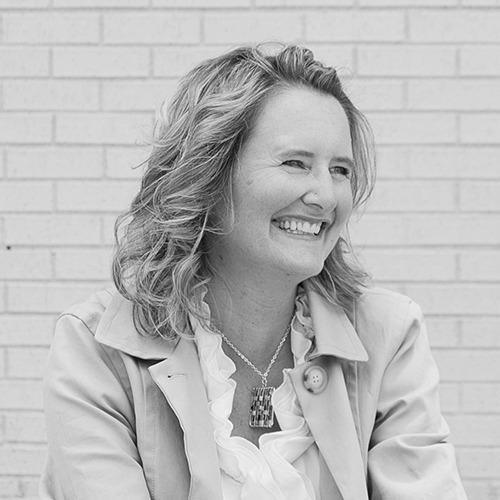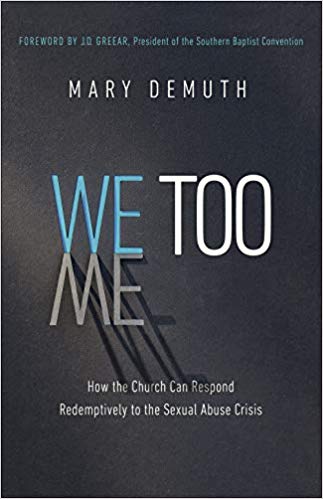Interview: Mary DeMuth Talks “We Too” with Carrie Carter


Note from the Editor: Wesleyan Accent writer Carrie Carter recently interviewed author and church leader Mary DeMuth about her new book on sexual abuse and the church, We Too: How the Church Can Respond Redemptively to the Sexual Abuse Crisis. DeMuth’s tradition is not alone as American Protestant church life has been rocked by the faith community’s own #metoo moment, #churchtoo. From megachurches to historic denominations, the ripple effect of revelation has been far-reaching. Wesleyan Accent extends gratitude to clergy spouse Carrie Carter for shining the spotlight on this new resource.
Warning: This interview includes references to sexual abuse that some may find a trigger of traumatic response.
I grew up in a faith community where abuse was not spoken of, where sex was a taboo topic in any context. So as one can imagine, my understanding of sexual abuse was quite simplistic well into adulthood. How could a man or woman of God do such horrific things? I confess that it was easy to feel smug when scandal rocked the Roman Catholic Church, because somehow I felt like Protestants were different.
They’re not. At all. How arrogant of me to think so.
It took a little longer for the corner of that rug to be lifted, but all that filth is the same. Sexual abuse is a darkness that has pervaded the Church for centuries. No branch of faith is above another when it comes to the pervasiveness of sin. The flames of sexual abuse have scarred people I love. People who trusted and were burned.
For this reason I jumped at the chance to review We Too: How the Church Can Respond Redemptively to the Sexual Abuse Crisis. We Too is now available for purchase, and it was written to help those in ministry leadership to understand the far-reaching effects of sexual abuse and how to support to those on the healing journey. It was truly an honor to interact with Mary and to hear her thoughts on a topic so vital for our ministry leaders right now.
CARRIE CARTER: For those who might not be familiar with you, tell us a little bit about your story.
MARY DEMUTH: I am a sexual abuse survivor. When I was five years old, neighborhood teens repeatedly raped me over the course of my kindergarten year. My father was a predatory man as well. And I found myself during a lot of my childhood being approached by predators. I spent a lot of time running away from those who wanted to steal from me. I met Jesus when I was fifteen through the ministry of Young Life. I have been on a decades-long healing journey since then.

CC: Was We Too: How the Church Can Respond Redemptively to the Sexual Abuse Crisis written as a response to the recent issues that have been exposed to light in the evangelical world, or was it a work that was already in process?
MD: In some ways it’s been in process for decades. I have been speaking about this issue a very long time, but it has finally gotten teeth because of the evangelical scandals of late. I am grateful that Harvest House Publishers took a huge risk in publishing this book.
CC: Was there anything during the research and writing of We Too that you didn’t already know? If so, what impact did this new knowledge have on you?
MD: I’ve been seeped in this for decades. But I was particularly surprised at the numbers outside the United States. In other cultures, the numbers are significantly higher percentages of women and children being exploited. Consider this: “Some 35% of women globally have experienced some form of sexual violence, though because of the nature of secrets, this number is most likely underreported. For some countries, the statistics are even more shocking: 57% of Bangladesh women, 77% of Cambodian women, 79% of Indian women, and 87% of Vietnamese women and 99% of Egyptian women have experienced some form of sexual harassment. Remember, harassment is not the same as sexual violence. Harassment involves innuendo, inappropriate comments, and unwanted sexual solicitation. 120 million girls globally have experienced forced sex. 750 million girls will be married before their eighteenth birthday.[1]” (Excerpt)
CC: What was the most difficult section of We Too to write? What made it difficult for you?
MD: Recounting the first story in the book where I was abused by a doctor, and then telling the story at the end of the book of when I returned to the scene of the crimes [that occurred] when I was a five year old. There are so many fears in making those stories public, and the shame still looms.

“We all know someone affected by sexual abuse. Sadly, the secular media has shown more compassion than the church toward sexual abuse survivors. There is a holy reckoning unfolding before us in the church. People are fed up with secrecy, covering up, and the sheer proliferation of abuse—both inside and outside the church. It’s time for the church to become what it should be: a place of security, not shame; humility, not pride. By standing with survivors of sexual abuse, we can build a community of kindness and restoration—a place where God’s people are healed and made whole.”
Excerpt, We Too
CC: As the spouse of a ministry leader, I received no training on practical ministry, let alone how to minister effectively to sexual abuse survivors. What do you feel is the most important thing for us, as ministry spouses, to know?
MD: That, most likely, everyone you minister to is affected by this issue. It either happened to them, or they love someone who has had this story. The best thing you can do is err on the side of belief, listen, weep alongside, and pray. If there is an outcry from a minor, you must report this to the authorities. Instead of viewing sexual abuse survivors as drains on your energy, look at them as tutors to teach you what it means to turn to Jesus and lean on him for sustenance and strength. They have SO MUCH to teach us about discipleship.
CC: After reading We Too, I feel it is going to be a vital tool that needs to be on the shelf of every ministry leader’s library. Have you written any supplemental material or do you have recommendations for other resources to help navigate this crisis?
MD: I am in the process of writing a video study and guide. Two other great resources: The Child Safeguarding Policy for Churches and Ministries by Boz Tchividjian and churchcares.com.
CC: For churches that are ready to put protocols in place for the protection of children, is there an organization that you recommend for assistance with those protocols?
MD: Yes, netgrace.org. I also have an extensive list of resources for pastors and ministry leaders here: wetoo.org/pastors
To read DeMuth’s “8 Reasons Why the Church Doesn’t Like to Discuss Sexual Abuse,” click here.
[1] Meera Senthilingam, “Sexual harassment: How it stands around the globe,” CNN, 29 Nov 2018, https://www.cnn.com/2017/11/25/health/sexual-harassment-violence-abuse-global-levels/index.html